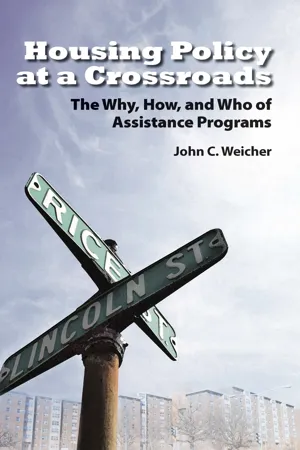
Housing Policy at a Crossroads
The Why, How, and Who of Assistance Programs
- 350 pages
- English
- ePUB (mobile friendly)
- Available on iOS & Android
About this book
Since Franklin D. Roosevelt's New Deal, American housing policy has focused on building homes for the poor. But seventy-five years of federal housing projects have not significantly ameliorated crime, decreased unemployment, or improved health; recent reforms have failed to revitalize low-income neighborhoods or stimulate the economy. To be successful in the twenty-first century, American housing policy must stop reinventing failed programs. Housing Policy at a Crossroads: The Why, How, and Who of Assistance Programs provides a comprehensive survey of past low-income housing programs, including public and subsidized housing, tax credits for developers, and block grants for state and local governments. John C. Weicher's comparative analysis of these programs yields several key conclusions: Affordability, not quality, is the most pressing challenge for housing policy today; of all the housing programs, vouchers have provided the most choice for the poor at the lowest cost to the taxpayer; because vouchers are much less expensive than public or subsidized housing, future subsidized projects would be an inefficient use of resources; vouchers should be offered only to the poorest members of society, ensuring that aid is available to those who need it most. At once a history of housing policy, a guide to issues confronting policymakers, and a case for vouchers as the cheapest, most effective solution, Housing Policy at a Crossroads is a timely warning that reinventing failed building programs would be a very costly wrong turn for America.
Frequently asked questions
- Essential is ideal for learners and professionals who enjoy exploring a wide range of subjects. Access the Essential Library with 800,000+ trusted titles and best-sellers across business, personal growth, and the humanities. Includes unlimited reading time and Standard Read Aloud voice.
- Complete: Perfect for advanced learners and researchers needing full, unrestricted access. Unlock 1.4M+ books across hundreds of subjects, including academic and specialized titles. The Complete Plan also includes advanced features like Premium Read Aloud and Research Assistant.
Please note we cannot support devices running on iOS 13 and Android 7 or earlier. Learn more about using the app.
Information
Table of contents
- List of Tables
- Preface
- Introduction
- 1 Housing Assistance and the Problems of Poverty
- 2 Housing Conditions and Problems
- 3 Housing Assistance Programs: Taxonomy and History
- 4 Program Activity and Costs in the Aggregate
- 5 The Voucher/Production Debate: Program Comparisons
- 6 The Voucher/Production Debate: Neighborhood Issues
- 7 The Voucher/Production Debate: Program Costs
- 8 The Voucher/Production Debate: Program Efficiency
- 9 Is There Enough Housing?
- Conclusion
- Notes
- References
- About the Author